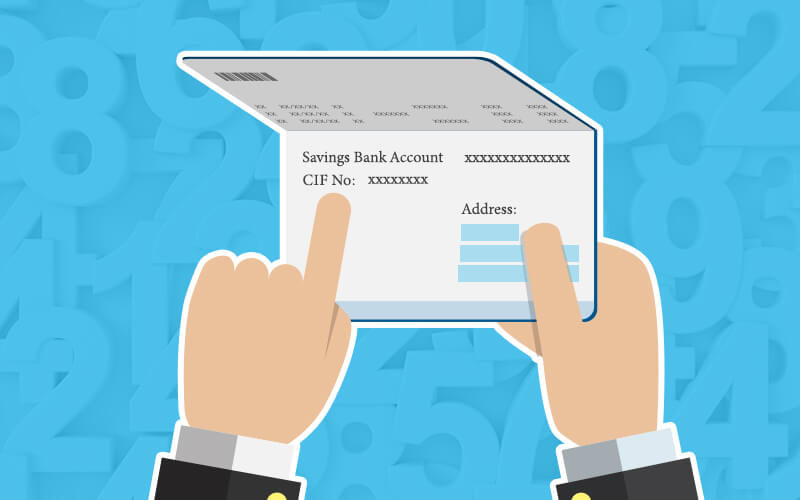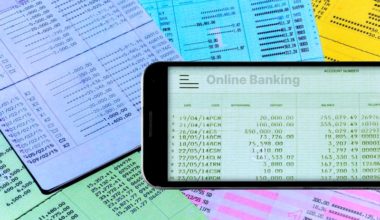In the world of banking and finance, the term “CIF number” may not be as familiar as a savings account or a credit card, but it holds significant importance. Short for “Customer Information File,” a CIF number is like a digital fingerprint that uniquely identifies each account holder. It plays a crucial role in simplifying and securing your financial transactions, ensuring that your banking experience is seamless and secure.
In this guide, we will delve into why the CIF number is essential, how it benefits both you and your bank, and how to locate and safeguard it.
What is a CIF number in a Bank Passbook?
Customer Information File” can be abbreviated as CIF. This term is often used in relation to bank accounts and refers to a unique 11-digit number that appears on a bank passbook. The CIF number contains important information about the account holder, including their banking history and account details. In addition to appearing on the bank passbook, the CIF number may also be used by the bank to identify the account holder and their account when conducting transactions or providing other services. It is important to keep your CIF number secure, as it contains sensitive personal and financial information.
- The CIF number, or Customer Information File number, is a unique 11-digit code that contains important information about the account holder and their banking history.
- This information may include KYC details, transactions made, and the type of bank account, as well as personal details like age and date of birth.
- The CIF number allows the bank to track and manage the account holder’s information, and helps to reduce the risk of fraud or confusion when providing banking services.
- Like an Aadhaar card number, the CIF number is unique to each individual and is different from one user to another. It is important to keep this number secure, as it contains sensitive personal and financial information
What are the Features of a CIF Number in a Bank Passbook?
The following are some of the factors that define the significance of a CIF number in a bank passbook:
- Unique identification: A CIF number is a distinctive code that contains crucial information about an account holder, such as their identity documents and account details. This uniqueness helps in accurate identification.
- Confidentiality: The CIF number plays a vital role in maintaining the confidentiality of an account holder’s information. It ensures that sensitive details are safeguarded and only accessible to authorized bank personnel.
- Location: CIF numbers can be found in various places, including the bank passbook, online banking portals, and mobile banking applications. This accessibility allows account holders to retrieve their CIF number conveniently.
- Information retrieval: Banks use the CIF code to efficiently retrieve account holder information. This retrieval is essential for verifying transactions, processing loan applications, and providing tailored banking services.
In essence, a CIF number serves as a secure and organized way to manage and protect customer data while streamlining banking processes. It enhances security and ensures that account-related operations are carried out smoothly and accurately.
How Does CIF Number Work?
CIF (Customer Information File) and CIF numbers are essential components of the banking system, facilitating efficient customer management and banking operations. Here’s how CIF and CIF numbers work:
1. Creation of CIF Number:
- When a customer opens an account with a bank, the bank assigns a unique CIF number to that customer.
- This number serves as an identifier for the customer across all the services and accounts they hold with that particular bank.
2. Information Storage:
- The CIF contains comprehensive information about the account holder. This information includes personal details (name, address, date of birth), contact information, identity documents (like Aadhar card, PAN card, passport), account types (savings, fixed deposit, loan), transaction history, and more.
- All this data is securely stored in the bank’s database under the corresponding CIF number.
3. Linking Multiple Accounts:
- A single CIF number can be linked to multiple accounts held by the same customer in the same bank. This can include savings accounts, fixed deposits, recurring deposits, loans, and credit card accounts.
- Linking these accounts to the same CIF number streamlines the management of the customer’s financial portfolio.
4. Customer Verification:
- When a customer interacts with the bank, whether for updating personal information, opening new accounts, applying for loans, or conducting transactions, the bank may request the CIF number.
- The CIF number helps verify the customer’s identity and ensures that the requested actions are attributed to the correct account holder.
5. Data Retrieval and Transaction Tracking:
- Banks use CIF numbers to retrieve customer information quickly and accurately. This is particularly important for verifying transactions, investigating discrepancies, and approving various banking services.
- The CIF number is associated with every transaction, ensuring that each action is recorded and linked to the respective customer’s account.
6. Enhanced Security:
- CIF numbers enhance the security of customer accounts. They are used as a part of the authentication process, reducing the risk of unauthorized access or fraudulent activities.
7. Customer Service:
- When customers contact the bank’s customer service for inquiries or assistance, they may be asked to provide their CIF number. This helps customer service representatives access the relevant account information efficiently, leading to better and faster service.
What Information Does a CIF Number Contain?
A CIF (Customer Information File) number typically contains:
- Personal Details
- Contact Information
- Identity Documents
- Account Information
- Transaction History
- KYC Information
- Nominee Details
- Demographics
- Bank-Specific Data
What is the Importance of CIF Number?
- Customer identification: The CIF number helps banks identify and differentiate their customers. It ensures that each customer’s information is distinct and easily accessible.
- Account management: The CIF number is used to link all the accounts and services associated with a customer. It provides a centralized view of a customer’s banking relationship, including savings accounts, current accounts, fixed deposits, loans, and other services.
- Data security: The CIF number plays a crucial role in ensuring the security of customer data. It helps in verifying the authenticity of customer information and prevents fraudulent activities.
- Easy access to information: With the help of CIF numbers, banks can quickly retrieve customer information and history. This enables efficient and personalized customer service, as well as facilitates faster processing of transactions and requests.
- Customer relationship management: Banks use the CIF number to maintain a comprehensive record of each customer’s interaction and transaction history. This helps in better understanding customer preferences and needs, allowing banks to provide tailored services and offers.
- Account portability: If a customer wants to switch banks or transfer their account to another branch, the CIF number simplifies the process. It enables the smooth transfer of customer data and account details without any disruption in banking services.
How to Find a CIF Number?
- Finding your CIF (Customer Information File) number can vary depending on your bank and how they provide access to customer information. Here are some common methods to find your CIF number:
Bank Passbook:
- Check your physical bank passbook. The CIF number is often printed on the front or inside the passbook. It’s usually located near your account details.
Bank Statement:
- Look at your bank account statement. Many banks include the CIF number on the statement, usually near your account number or personal information.
Internet Banking:
- Log in to your bank’s internet banking portal using your credentials.
- Once logged in, navigate to the account information section or customer profile.
- You may find your CIF number listed there along with your other account details.
Mobile Banking App:
- If your bank offers a mobile banking app, open it and log in.
- Explore the app’s settings or account details section, where you may find your CIF number.
Customer Service:
- You can contact your bank’s customer service through their hotline or by visiting a local branch.
- When speaking with a customer service representative, request your CIF number. They will ask you for some identification details to verify your identity before providing the information.
SMS/Email Alerts:
- Some banks send SMS or email alerts for transactions and account updates, which may include your CIF number. Check your recent alerts for this information.
Chequebook:
- If you have a chequebook associated with your account, your CIF number may be printed on the cheques.
Welcome Kit:
- When you first opened your account, the bank likely provided you with a welcome kit. Check the documents or papers in the kit; the CIF number might be mentioned there.
Visiting the Bank:
- If you’re unable to find your CIF number through the above methods, visit your bank’s local branch. They will be able to assist you in locating your CIF number after verifying your identity.
When Should You Share Your CIF Number in Banking Transactions?
Yes, the CIF (Customer Information File) number is typically considered confidential information. While it is used for internal banking purposes and may be shared with bank employees for verification and administrative procedures, it should still be treated as sensitive and not shared with unauthorized individuals or entities. The CIF number is linked to your
personal and financial data, and its confidentiality helps protect your financial assets and identity. It’s important to exercise caution and only provide your CIF number when dealing with legitimate banking processes and authorized bank personnel.
Difference Between CIF Number and IFSC Code?
| Aspect | CIF Number (Customer Information File Number) | IFSC Code (Indian Financial System Code) |
|---|---|---|
| Purpose | Used for identifying bank customers and managing customer information. | Used for identifying specific bank branches and routing electronic fund transfers. |
| Confidentiality | Considered confidential and should be kept secure. Shared with bank employees for verification and administrative purposes. | Public information and widely used by customers, businesses, and individuals for electronic fund transfers. |
| Functionality | Primarily used internally by the bank for customer data management, identity verification, and account tracking. Not directly involved in financial transactions. | Facilitates the accurate transfer of funds between banks and branches, ensuring money is directed to the correct recipient’s account. |
Conclusion:
In summary, the CIF number is a crucial part of banking. It holds your essential details, helps with banking tasks, and keeps your financial information secure. Just remember to keep it confidential and share it only when necessary for authorized banking activities.






